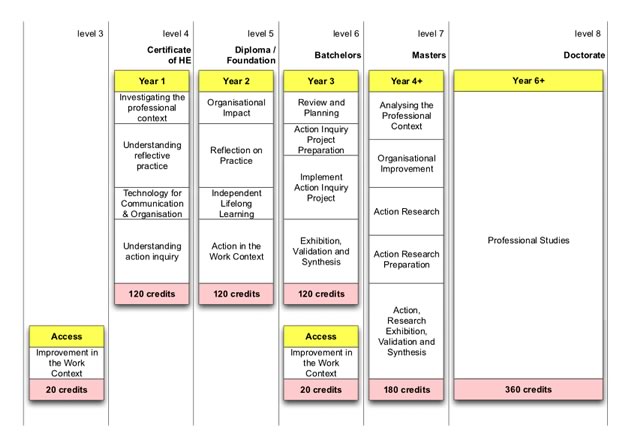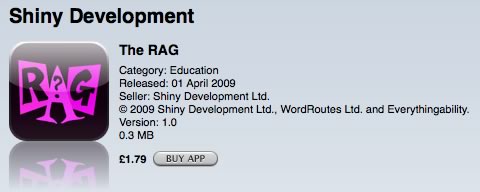
Friends John Davitt and Tom Smith, to say nothing of Dave Verwer, build a delightful application for the iPhone – and now anyone can get it in the iPhone store…
…and better still, you can shout about what you did in the face of its provocation!

A new learning landscape

Friends John Davitt and Tom Smith, to say nothing of Dave Verwer, build a delightful application for the iPhone – and now anyone can get it in the iPhone store…
…and better still, you can shout about what you did in the face of its provocation!
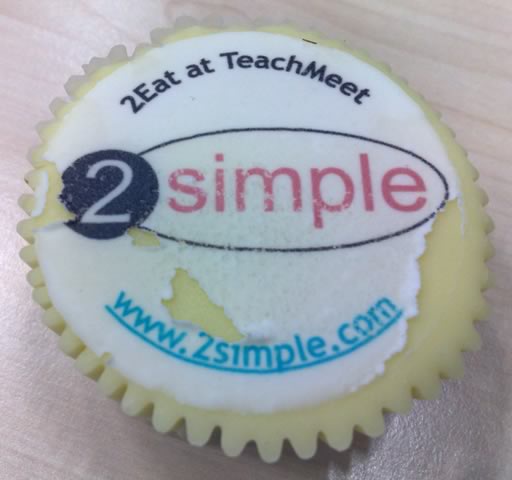
This TeachMeet was brave enough to throw the rules up in the air and try a new plan – and mostly it worked! I enjoyed the way the break-outs gave more intimate discussion and flexibility, but I missed the quickfire and serendipitous action of the random speaker. Most of all there was a mature relationship with commercial sponsors who were very much present, but respectfully supportive – thanks to all of them.
There were great talks from Drew, Tom and Ollie and others I didn’t hear, but I also loved the Max’s ‘next thing coming’ talk with augmented reality, Blue Peter style. As ever with Teachmeet there was a mix of old-timers (I mean you Penny) and newcomers (Edith) and enthusiasm in buckets.
Having done CEME, can we do the top of Canary Wharf next time? Can’t think of anything else they’ll want it for…

There are some major proposed changes in NZ law that will have an impact on education.
The proposed Section 92 of the NZ Copyright Amendment Act assumes Guilt Upon Accusation and forces the termination of internet connections and websites without evidence, without a fair trial, and without punishment for any false accusations of copyright infringement. An organisation called the Creative Freedom Foundation has been set up to specifically represent artists voices on these issues.
Check out their website: http://www.creativefreedom.org.nz , sign up and help NZ MPs make an informed decision about S92!

Adrian Mitchell has died;
Boo!
Adrian asked to be lied
to
About Vietnam, I cried
Hoo!
A priapic puppy made me laugh
And kittens,
two
Feeling daft through and
through
But mostly, I miss him

It’s illuminating when an organisation such as the BBC takes the trouble to explain its efforts to deal with the flood of expression that has risen in a Web 2.0 world.
Thanks to Tom van Aardt, Communities Editor, BBC Future Media & Technology, for blogging their experiences here – Strictly Message Board: What Happened
“Eventually, I decided to close the Strictly Come Dancing board at 22:00 so the moderators could work through the backlog of messages.”
He doesn’t mention the hours that the reader can sink into reading such commentary in the search for insight, a phenomenon I have recently experienced whenever trying to make sense of high definition television or keeping up with reaction to Obama’s election!

I have been reading the report ‘On-line Innovation in Higher Education‘ submitted by Sir Ron Cooke to John Denham recently and I’m not impressed.
It seems to be but a variation on the ‘content is king’ theme and, by its own standards, seems to miss many points.
The title of this blog ‘Content is muck’ is intended to disparage this approach and at the same time recognise the importance of high quality, accessible content as a fertiliser for the growth of knowledge amongst learners.
Probably most critical is the following:
“2.5 The education and research sectors are not short of strategies but a visionary thrust across the UK is lacking.” p8
So where in this document is a vision outlined – where is it to come from? I (and many others) would be happy to offer one! But seriously, this is the moment and little here is visionary.
These further quotations from the document raised a range of issues:
“1.1 [..] We lag behind in generating and making available high quality modern learning and teaching
resources. [..]” p3
The difficulty I have with this is the way in which we go about catching up. We should be careful not to spend too much money on material which becomes out-of-date within a year, is specific to particular courses, contexts and levels or fails to enhance the creative rôle for the learner in developing their own knowledge.
“3.15 [..] diagram [..] showing areas where students are currently pushed beyond their comfort zones.[..]” p12
The diagram referred to shows some ICT tasks in a grid with four quadrants – the top left shows tasks which are ‘”Familiar” / “Not comfortable using” and includes “Using social networks such as Facebook as a formal part of the course”, but the task “Using existing online social networks to discuss work” is shown in the bottom right quadrant “Unfamiliar” / “Comfortable with using” – how can this be, what do they mean? Sadly the document lets us down here, with no reference to a source, unlike the bulk of the work. A report of this significance needs to be of the highest quality of it is to be convincing.
“3.19 [..] iv. where students tend to learn almost entirely at a distance (e.g. The Open University and the student base the UK e-university aimed for) high quality, purpose written, online materials and high quality online support services are essential;” p13
I agree in part, but what does “tend to learn almost entirely as a distance” mean? Is it not the case that learning materials and support for face-to-face learning should be of similar standard? The unspoken assumption is that learning at a distance is solitary and thus the materials and support must compensate for the lack of ‘learning conversation’ – this is simply not the case in the modern social web.
We have had extensive experience over five years of fully online provision in the Ultraversity project where “purpose written, online materials” have been minimal. This has led to no lack of quality, as the guidance and support is generated through dialogue shared by a cohort of students – the online community of inquiry. Authoritative sources, journals and textbooks including key professional documents, are available widely on the internet and can be engaged with rigorously, critcially and comprehensively. This way of organising learning is most effective in that it also sets up the student for further lifelong learning.
“3.28 [..] The e-university was ahead of its time but the UK can learn from its mistakes and it is not too late to try again to address the demand for virtual, largely on-line education in the UK and
elsewhere. [..]” p15
I think not – the e-university did not take a visionary nor innovative approach in my view and was not at all ahead of its time, but tried to take old approaches into new technology with minimal account of growing evidence of the efficacy of new models of online learning.
For the sake of my tax bill please lets not try again without considerably more care and wisdom!
Jamie Tuplin, Stan Owers, Mick Waters and Pete Williamson – presenters at the Owers Lecture 2008
The Guardian reports “Oxbridge to accept engineering diploma” – welcome news to learners and their teachers pioneering the Engineering Diploma in Barking & Dagenham schools. This timely announcement comes a week after another stimulating and informative Owers Lecture presented by Jamie Tuplin and Pete Williamson, and an excellent commentary in response from Mick Waters, Director of Curriculum at the Qualifications and Curriculum Authority. This fourth Owers lecture, organised by Core Education UK, was once again held at Oracle UK‘s offices in Moorgate, London on November 12th, thanks to Oracle’s ever-supportive Chris Binns who is champion for Oracle’s altruistic ventures Think.Com and ThinkQuest in the UK.
Jamie Tuplin, who leads the diploma developments Barking & Dagenham Local Authority and Pete Williamson, Head of Design Technology at the Warren School (and Learning Line Lead for Engineering for the authority), reported their experiences & issues of Engineering Diploma implementation in the first three months.
The question put to the audience was ‘Can Diplomas Cure the ‘English Disease’?’ and Mick Waters’ response, designed to provoke further debate, was to outline several diseases, all of which needed attention! In the end we had to stop, but discussion was strong and all participants were hungry for more.
I was surprised at the size of the fine, £7,015 plus £1,000 costs, handed down to the London College of Business and Accountancy which had cheated by claiming accreditation from the British Computer Society and from the Association of Accounting Technicians.
This surely isn’t a great deterrent, considering the potential damage to the reputation of its students…
The business of training looks troubled to me – a new credit-crunch to come?
 I have enjoyed discussing with colleagues at Manchester University the nature of online community, which made me think about the various terms used – hence the above slide. It was also fun to explain the work done over ten years and how we came across many of the concepts we take for granted. Here are the slides as a PDF file, which miss out on the many videos I showed of participants talking about their experience.
I have enjoyed discussing with colleagues at Manchester University the nature of online community, which made me think about the various terms used – hence the above slide. It was also fun to explain the work done over ten years and how we came across many of the concepts we take for granted. Here are the slides as a PDF file, which miss out on the many videos I showed of participants talking about their experience.
This was the best hour or so I’ve spent on YouTube…. about YouTube.
It helped me to see development and change happening in YouTube usage and to feel that there is still a way to go to be mature as a population online, but what an exciting journey?
Much more insightful debate at the Digital Ethnography blog.
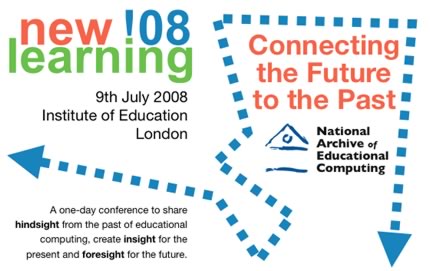
This conference is taking place on Wednesday with about 50 folk – I know many others would have liked to come, but this is only a start and there’ll be more. For those unable to be there, there will be plenty of reporting to come, and you can download the conference pack and archive leaflet right here.
More importantly, if you have a story to contribute about your experiences with educational computing over the last four decades, contribute it in the stories section of the National Archive of Educational Computing website and if you want to do more, fill in the form in the support section.

The JISC Regional Centre South West recorded and webcast my closing keynote to their conference using Adobe Connect and you can find the recording here. Thanks to Melanie Roberts at JISC RSC SW for managing the slides & chat and to her colleague who filmed and recorded sound so expertly. It was interesting to go back over the transcript from the four remote participants and see what worked (and not) for them – movies seem to be a bit of a problem, a shame since I had taken the trouble to transcribe and dynamically subtitle some of them using Quicktime text tracks – how does that get routed out to Adobe Connect?
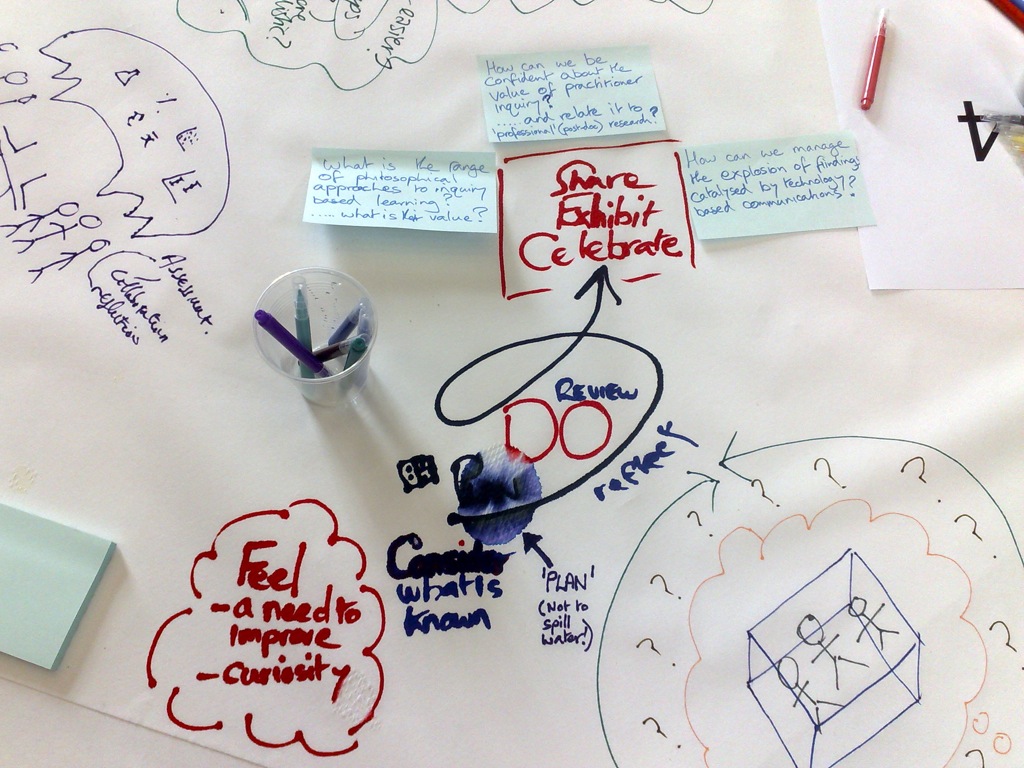
The Learning Through Enquiry Alliance conference at Sheffield University is a breath of fresh air – practitioner led, but research oriented, but above all a sense of camaraderie with many others struggling with the ideas we have been exploring for the last five years.
A ‘world café’ exercise to break the ice led to my re-draft of an action inquiry model on the tablecloth, adding my latest concern for ‘feeling’ based on my interest in John Heron’s work. I have added a ‘FEEL’ aspect – feeling the need to improve, feelng curiosity which relate to Heron’s ideas of zest and interest around delight. We have for a long time talked about exhibiton as a mode of assessment – I have clarified in this diagram by adding the word ‘celebrate’, that this is as important to feeling as it is to knowledge and communication.

I am giving the closing keynote in a few minutes at this venue for the JISC South Western Regional Support Centre’s Summer Conference. The theme is social software and naturally, I am speaking about the way we can build from past thinking and find foundations for future improvement. Here are the slides as a PDF.
Tara Brabazon in the Times Higher Education Supplement when discussing coursework masters degree courses:
“They are squeezed between the crowd control of undergraduate education and the over-bureaucratised doctoral programmes that dislodge the historically functional relationship between a PhD candidate and supervisor.”
She draws attention to the remarkable creativity of her students, when unleashed with a little flexibility:
“Although there is a science – and craft – to curriculum, we never know how our students will remix our aims and riff off our structure to create melodies and syncopations beyond our lesson plans.”
I know what she’s talking about and we have designed this thinking in to our new degree framework for batchelors, masters and doctorate at the University of Bolton.
Although her article is flowery in its language and this begins to grate as I get to the end, the sentiments and concepts are important:
“These students want a second chance to remake their careers and lives. Their enthusiasm is contagious, and their examples show that change and creativity emerges when courageous students decide to live their lives differently.”
Our take on this fertile opportunity is Inter-disciplinary inquiry-based learning founded in an action research philosophy.
At this point in her article, Tara switches to talking about the link between research and teaching, through the students’ inquiry referencing the HEA report Linking Teaching and Research in Disciplines and Departments.
My worry is that this paper, and her language, are not radical enough in conceiving students as co-researchers in the 21st century. Surely now, ivory-tower academic authority is no longer seen as the know-it-all top of the pyramid (to mix a few metaphors myself), but still has a vital role to play in gathering the best, modelling excellence and rigour and wisely critiquing and deferring to the evidence base from professional practice.
Tara pleas:
“I hope that through the stress and the marking, the stress and the moderation, the stress and the exam boards, academics feel buoyant at their teaching achievements but humbly reflective about what our students can teach us.”
Agreed, and I suggest we should focus on how to make these important teaching acts as delightful and stress free as possible.
My first post about TeachMeet was a hurried blog in case Ewan offered a prize for the first person to Blog the event!
More reflection, and waiting until the end, allows a more thoughtful blog which fills in some of the blanks.
Blank 1 – why speak about delight?
It was delightful to be able to speak about delight, and to discuss with colleagues in the breaks to ‘orient’ my thinking about this important topic.
I failed to say that I care to make an analysis of delight for many reasons:
Blank 2 – what a stonking set of presentations!
I failed to mention the wealth of speakers and the high quality of their ideas and practices on parade. Egocentrically, and only after Drew Buddie had pointed it out, I was struck by the chickens coming home to roost from Ultralab‘s and Apple Teacher Institute work in the early ‘noughties’, such as movie making and stop-motion animations around social and serious issues. More moving were the confident presentations from folk like Sarah Hackett on using Moodle to teach folk fiddle and Tom Whitehead on animal shape poetry workshops, both researchers from Ultraversity, these along with many others were inspiring.
Blank 3 – FlashMeeting
I had volunteered to be the meeting end of an online video-conference for those who couldn’t be arsed couldn’t get to Redbridge. 🙂 Thanks to David Noble, Anthony Evans and Nic Hughes for making it all so easy. It seemed to work well, using FlashMeeting and connecting my Apple MacBook Pro to a Canon digital video camera with a firewire cable and using a directional microphone to get the best quality – I rely on reports from participants as to whether this was effective and I apologise now for the time through the break when I went to get a beer and got cornered in the bar – I came back to find the camera pointing at the ceiling! I only regret not carrying through my original plan to use a second data projector so that the audience in the building could see the participants out there and perhaps respond to their questions and comments. Next time.
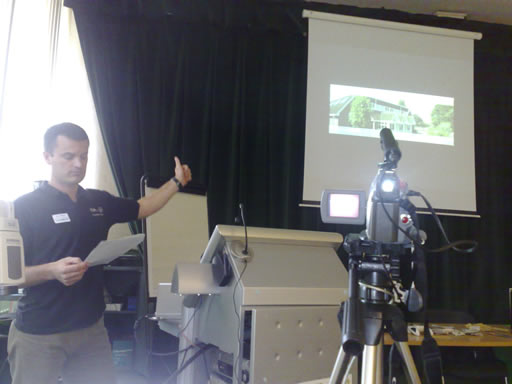 Great fun here in Redbridge Teachers’ Centre, free beer, good conversation and interesting ideas. As Ewan put it “Butlins for geeks”
Great fun here in Redbridge Teachers’ Centre, free beer, good conversation and interesting ideas. As Ewan put it “Butlins for geeks”
Ever since reading about John Heron’s ‘up-hierarchy’ of delight, with his wonderfully expressive language, I have been enjoying adding new elements (although disregarding for now their connection, except as a list). I have made a poster of them and will be talking about them (if chosen to speak) at the TeachMeet in Redbridge on Monday 19th May.
The idea is that they are a source of explanation and stimulus for designing delight into teaching & learning.
Why do we like playing games on the computer? – perhaps because high quality and visually seductive graphics offer ‘appreciation’ and the many choices and their consequences feed ‘zest’.
Why do we like learning together? – perhaps because we get ‘conviviality’, ‘recognition’ and ‘controversy’.
Why do we persist when learning is tough? – perhaps because there is ‘interest’, ‘recognition’ and ‘resolution.
Is this all too obvious? Or do you, like me, want to put this poster on your wall to keep it fresh in your mind?

An analysis of delight by Richard Millwood is licensed under a Creative Commons Attribution-Share Alike 2.0 UK: England & Wales License.
Based on a work at blog.richardmillwood.net.An Analysis of Delight
Almost five years to the day that Ultraversity was validated at Anglia Ruskin University, we have received conditional approval for a new scheme based on the same philosophies of learner-centred, work-focussed, community-supported, action-inquiry and innovative assessment.
This IDIBL course framework validated at the University of Bolton is more ambitious in scope, more refined in character and draws fresh inspiration from the organisational thinking from its home in the Institute for Educational Cybernetics.
We can now begin to recruit in earnest for a Masters course in ‘Learning with Technology’ and follow it up with further courses in Regeneration & Sustainable Communities, Chronic Healthcare and other societal thematic problems which need active and vibrant attention.
In each case the proposals will be relatively cost-effective to approve by basing their pedagogy and organisation on our IDIBL framework: